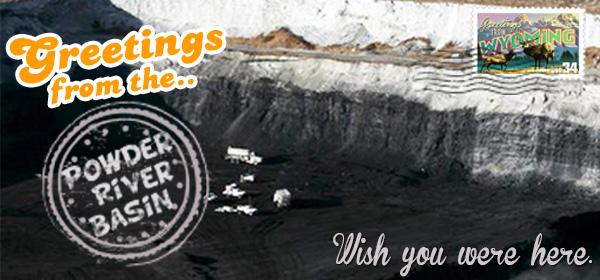It’s been a crummy summer for the federal Bureau of Land Management.
The bureau sells development leases to mining companies that want to scrape out coal deposits that lie under taxpayer-owned dirt on federal land.
It has managed to draw fire from the Interior Department’s Inspector General, the GAO, The Nation and a half-dozen environmental groups.
The gripe is that by charging bargain-basement prices for its coal – that is, our coal – BLM is perhaps the most important player keeping the American coal industry alive, while costing American taxpayers some $30 billion over thirty years according to a July report by Center for American Progress.
One important way BLM undervalues American coal is by failing to take into account the vast mark-up domestic producers can reap by shipping the coal to Asia, Europe or South America, rather than trying to unload it on a shrinking American market, where 150 coal-fired power plants have already closed and new carbon limits are likely to make coal less and less economical according to a July report by the Sightline Institute.
As the American wing of Big Coal turns increasingly to exports to prop up what’s left of its bottom line, coal producers have come to depend on vast mineral reserves in the western United States, particularly in the Powder River Basin in Wyoming and Montana, that can be extracted cheaply via surface mining and shipped overseas. Almost all of this coal is found on federal lands where the Bureau of Land Management is virtually giving its leases away, according to several recent studies.
A July report by Greenpeace – “Leasing Coal, Fueling Climate Change: How the Federal Coal Leasing Program Undermines President Obama’s Climate Plan” – goes several steps further than others, pointing out that in addition to ignoring coal’s export value, BLM failed to consider carbon pollution impacts of between $52 billion and $553 million from coal leases issued during the Obama administration. And by making coal so cheap, the bureau undercuts Obama’s own plan for reducing greenhouse gas emissions which the adminstration is fighting for against intense opposition from Republicans and the lobbying and financial might of the fossil fuel industry.
“With companies looking to double America’s coal exports, the nation’s growing position in the global energy trade could make global warming worse, fueling the world’s demand for coal when many experts say most fossil fuels should remain in the ground to avert the most disastrous effects of climate change,” noted the Associated Press in a recent story.
If the Obama-ites have missed it, at least one federal judge sees the connection.
In June, district court Judge R. Brooke Jackson blocked the expansion of a Colorado mine, scolding the administration for failing to use its own social cost of carbon figures to assess the expansion’s impact on global warming.
Making matters worse is that bidding in the coal leasing program in the west is already rigged in favor of cheap leases. This goes back to 1990, when President George H.R. Bush’s administration reversed decades of precedent and decided that the Powder River Basin was not a “historic coal production region,” effectively ceding control over the lease program to Big Coal. Since then, 96 of 107 western coal-lease sales held by BLM have had only one bidder.
One study that documents coal sales at mines Wyoming, New Mexico, Montana, North Dakota, Colorado and Utah by some of the largest producers, including Peabody Energy, Arch Coal and Cloud Peak Energy zeroed in on specific companies to expose the mechanics of what has become modern coal’s dominant business model.
The report, entitled “Unfair Market Value: By Ignoring Exports, BLM Underprices Federal Coal” was prepared by the Sightline Institute and four other environmental groups.
A case in point is Cloud Peak’s Spring Creek Mine in southern Montana, near the Wyoming border.
Most of the 18 million tons of coal Cloud Peak sold its Asian customers in the last four years came from Spring Creek. The company paid the federal government – meaning us, the taxpayers – a maximum of 18 cents per ton for the coal, which Cloud Peak resold on the Asian market for more than $60 per ton for profits “four to five times as high as the margins that Cloud Peak earned on domestic sales.”
Cloud Peak, like other western producers, is pushing hard for the development of three new port or terminal facilities in Washington and Oregon, such as the proposed Gateway Pacific Terminal in Bellingham, Washington, which would connect by rail to its mines in Montana and Wyoming. Meanwhile, as the struggle over the terminals plays out, Cloud Peak is trying for another round of giveaways, by bidding for an additional 198 million tons of coal deposits next to Spring Creek.
Meanwhile, local residents activists, environmentalists and the Democratic governors
of Oregon and Washington are demanding that the administration consider the effect on global warming of building terminal facilities that would help double American coal exports.
So far, the administration has flatly refused.
Resources:
Center For American Progress: Federal Coal Leasing in the Powder River Basin – A Bad Deal for Taxpayers, July 2014
Sightline Institute: Unfair Market Value – By Ignoring Exports, BLM Underprices Federal Coal, July 2014
Greenpeace: Leasing Coal, Fueling Climate Change – How the federal coal leasing program undermines President Obama’s Climate Plan, July 2014
The Nation: How the Obama Administration Is Keeping Big Coal Alive, Zoë Carpenter, July 7, 2014
Associated Press: Not in My Backyard – US Sending Dirty Coal Abroad, Dina Cappiello, Jul. 28, 2014

